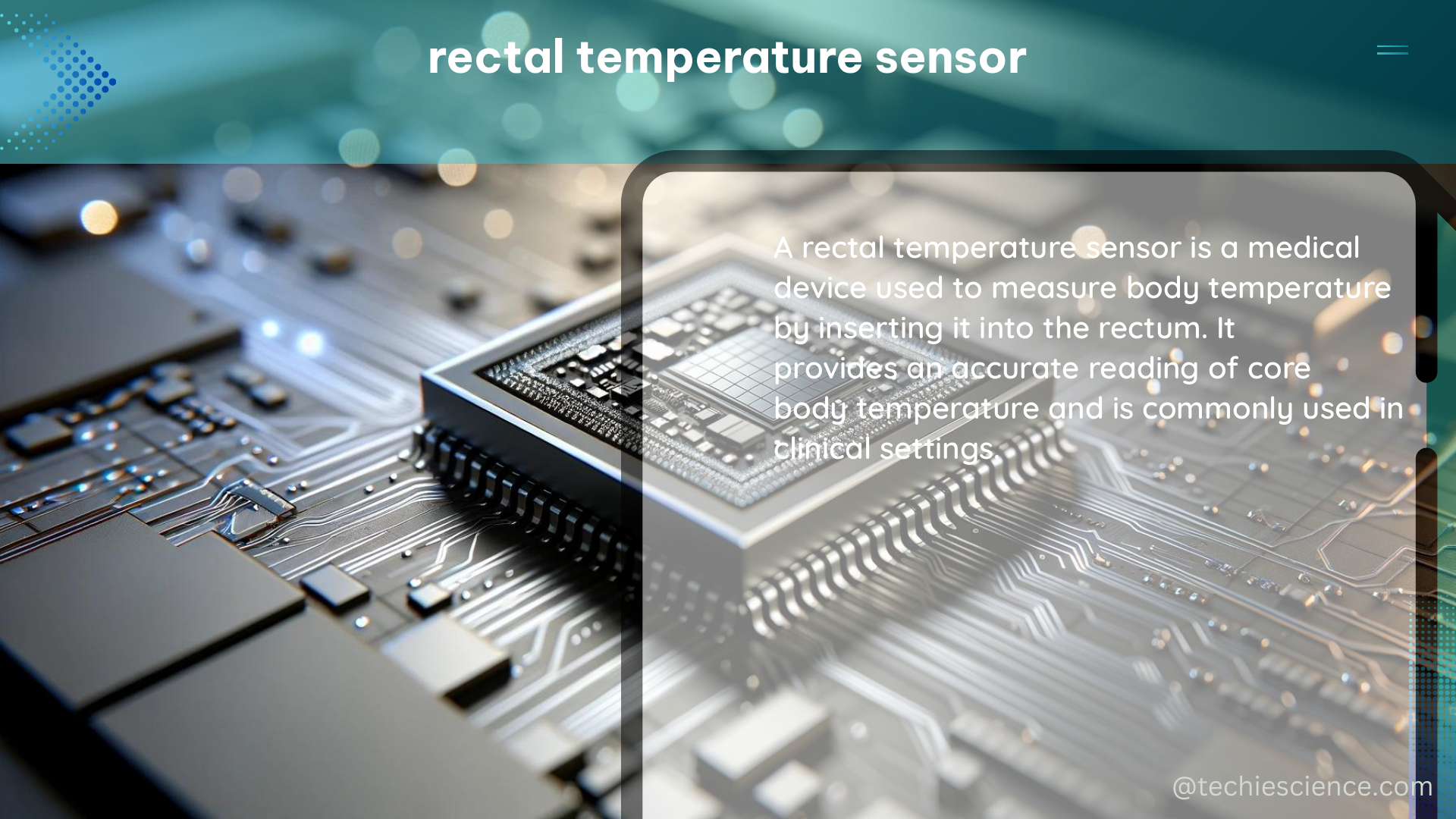The rectal temperature sensor is a specialized medical device used to accurately measure the internal body temperature by inserting a probe into the rectum. This method is considered the gold standard for temperature measurement, as it provides the most reliable and precise results, making it an essential tool in various healthcare settings.
Understanding the Basics of Rectal Temperature Sensors
Rectal temperature sensors come in two primary types: digital and mercury-based. Digital thermometers have become the more commonly used option due to their ease of use, quick response time, and enhanced safety features, as they eliminate the risk of mercury exposure in the event of a broken thermometer.
Temperature Range and Accuracy
The temperature range of a rectal temperature sensor should cover the normal human body temperature range, typically from 35°C (95°F) to 42°C (107.6°F). The accuracy of these sensors is a crucial factor, with digital thermometers typically achieving an accuracy of ±0.1°C (±0.18°F), while mercury-based thermometers have a slightly lower accuracy of ±0.2°C (±0.36°F).
Response Time and Probe Length
The response time of a rectal temperature sensor refers to the time it takes for the sensor to provide an accurate temperature reading after being inserted into the rectum. Digital thermometers generally have a faster response time compared to mercury-based models. The probe length of rectal temperature sensors can vary, with most ranging from 7.6 cm (3 inches) to 15.2 cm (6 inches) in length.
Power Source
Digital rectal temperature sensors are typically battery-powered, while mercury-based thermometers do not require a power source. The battery life of digital sensors can vary depending on the manufacturer and model, with some offering extended battery life for enhanced convenience.
Technical Specifications of Rectal Temperature Sensors

When selecting a rectal temperature sensor, it is essential to consider the specific technical specifications to ensure it meets your needs and provides accurate, reliable results.
Temperature Range
The temperature range of a rectal temperature sensor should cover the normal human body temperature range, typically from 35°C (95°F) to 42°C (107.6°F). Some advanced models may have an extended range to accommodate for hypothermia or hyperthermia conditions.
| Temperature Range | Typical Range | Extended Range |
|---|---|---|
| Minimum | 35°C (95°F) | 30°C (86°F) |
| Maximum | 42°C (107.6°F) | 45°C (113°F) |
Accuracy
The accuracy of a rectal temperature sensor is a critical factor, as it determines the reliability of the temperature readings. Digital thermometers typically have an accuracy of ±0.1°C (±0.18°F), while mercury-based models have a slightly lower accuracy of ±0.2°C (±0.36°F).
| Thermometer Type | Accuracy |
|---|---|
| Digital | ±0.1°C (±0.18°F) |
| Mercury | ±0.2°C (±0.36°F) |
Response Time
The response time of a rectal temperature sensor refers to the time it takes for the sensor to provide an accurate temperature reading after being inserted into the rectum. Digital thermometers generally have a faster response time, with some models achieving a reading in as little as 10 seconds, while mercury-based thermometers may take up to 3 minutes.
| Thermometer Type | Response Time |
|---|---|
| Digital | 10-60 seconds |
| Mercury | 1-3 minutes |
Probe Length
The length of the probe on a rectal temperature sensor can vary, with most ranging from 7.6 cm (3 inches) to 15.2 cm (6 inches) in length. The appropriate probe length may depend on the patient’s age, size, and specific clinical needs.
| Probe Length | Typical Range |
|---|---|
| Minimum | 7.6 cm (3 in) |
| Maximum | 15.2 cm (6 in) |
Power Source
Digital rectal temperature sensors are typically battery-powered, while mercury-based thermometers do not require a power source. The battery life of digital sensors can vary, with some models offering extended battery life for enhanced convenience.
| Power Source | Battery Life |
|---|---|
| Digital | 1-2 years |
| Mercury | N/A (no battery) |
Proper Use and Maintenance of Rectal Temperature Sensors
To ensure accurate and reliable temperature measurements, it is crucial to follow proper procedures for using and maintaining rectal temperature sensors. This includes:
- Calibration: Regularly calibrating the rectal temperature sensor according to the manufacturer’s instructions to ensure accurate readings.
- Cleaning and Disinfection: Properly cleaning and disinfecting the sensor probe between uses to prevent the spread of infections.
- Insertion Technique: Carefully inserting the probe into the rectum, ensuring it is positioned correctly and avoiding any discomfort or injury to the patient.
- Timing: Allowing the sensor to remain in the rectum for the recommended duration to obtain an accurate temperature reading.
- Interpretation: Interpreting the temperature readings in the context of the patient’s overall health and any underlying medical conditions.
Conclusion
Rectal temperature sensors are a vital tool in the healthcare industry, providing accurate and reliable measurements of internal body temperature. By understanding the technical specifications and proper use of these sensors, healthcare professionals can ensure accurate temperature readings and make informed decisions to support patient care.
References:
- Temperature Measurement – an overview | ScienceDirect Topics
https://www.sciencedirect.com/topics/nursing-and-health-professions/temperature-measurement - Checking dead body temperature to see how recently they died
https://www.reddit.com/r/EscapefromTarkov/comments/k6suji/checking_dead_body_temperature_to_see_how/ - Validity of Devices That Assess Body Temperature During Outdoor …
https://www.ncbi.nlm.nih.gov/pmc/articles/PMC1978469/

The lambdageeks.com Core SME Team is a group of experienced subject matter experts from diverse scientific and technical fields including Physics, Chemistry, Technology,Electronics & Electrical Engineering, Automotive, Mechanical Engineering. Our team collaborates to create high-quality, well-researched articles on a wide range of science and technology topics for the lambdageeks.com website.
All Our Senior SME are having more than 7 Years of experience in the respective fields . They are either Working Industry Professionals or assocaited With different Universities. Refer Our Authors Page to get to know About our Core SMEs.